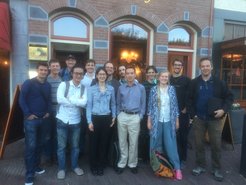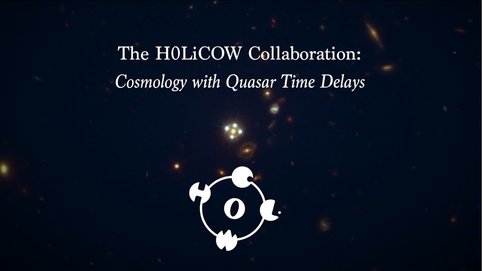Holy cow! Sherry Suyu to receive 2021 Berkeley Prize
Sherry Suyu (Max Planck Institute for Astrophysics (MPA) & Technical University of Munich (TUM)) is being honoured with the 2021 Berkeley prize for her leadership of the H0LiCOW collaboration, which is measuring the cosmic expansion rate using gravitationally lensed quasars. The group’s most recent research paper appeared in June 2020 and confirms that “local” measurements of the expansion rate do not match up with values obtained by measuring certain properties of the early universe’s cosmic microwave background radiation and extrapolating to the present using the standard cosmological model. There must be something wrong with the measurements, the model, or both, but so far, neither observers nor theorists have been able to figure out exactly what everybody’s overlooking.
The H0LiCOW collaboration
Let’s unpack the H0LiCOW acronym, which is actually a nested acronym. It stands for H0 Lenses in COSMOGRAIL's Wellspring. H0 (properly written as capital H0 with subscript zero, not letter O), is the Hubble constant, the current expansion rate of the universe. Lenses refer to gravitationally lensed quasars, in which the enormous gravity of a galaxy with billions of stars distorts space-time to form multiple images of a background quasar — a blazingly bright galaxy nucleus powered by a supermassive black hole feeding on surrounding gas, dust, and stars. COSMOGRAIL is the COSmological MOnitoring of GRAvItational Lenses, an international project measuring time delays for most known lensed quasars, producing a wellspring of data. Time delay refers to the fact that quasars vary in brightness; as light from each lensed image follows a slightly different path from the quasar to Earth, fluctuations in brightness appear in different images at different times. From those differences astronomers can determine the geometry of space-time in the lensing galaxy and, by inference, the combined mass of the galaxy’s visible and dark matter. Whew!

Each year the three AAS Vice-Presidents, in consultation with the Editor in Chief of the AAS journals, select the Berkeley prize winner for meritorious research published within the preceding 12 months. Reacting to VP Joan Schmelz’s email announcing her selection as the 2021 Berkeley prize recipient, Suyu wrote, “Thank you very much for this fantastic news! It is a great honour, not just for me, but for the entire H0LiCOW team! Our results took many years of hard work, and we are excited to establish a completely independent and competitive probe of cosmology. None of this would be possible without my wonderful H0LiCOW collaborators, and I am truly grateful to them.”
In addition to serving as Research Group Leader at MPA and an Assistant Professor at TUM, Suyu is a Visiting Scholar at the Academia Sinica Institute of Astronomy and Astrophysics (ASIAA). Her H0LiCOW team includes scientists at institutions in the United States, Europe, Japan, and Taiwan. In 2017, the European Research Council awarded her a grant to launch a new study of gravitationally lensed supernova explosions: HOLISMOKES (Highly Optimised Lensing Investigations of Supernovae, Microlensing Objects, and Kinematics of Ellipticals and Spirals). Suyu is also involved in the Excellence Cluster ORIGINS, an interdisciplinary collaboration of German institutions investigating the development of the universe from the Big Bang to the emergence of life.
Suyu earned her bachelor of science degree in astrophysics at Queen’s University, Canada, in 2001 and her PhD in physics at Caltech in 2008. Then came postdoctoral stints at the University of Bonn, Germany; the University of California, Santa Barbara; and Stanford University. She became affiliated with Academia Sinica in 2013 and began joint appointments at MPA and TUM in 2016. In 2018, she held an Emmy Noether Visiting Fellowship from the Perimeter Institute in Waterloo, Ontario, Canada. She has published more than 90 research articles in peer-reviewed journals.







